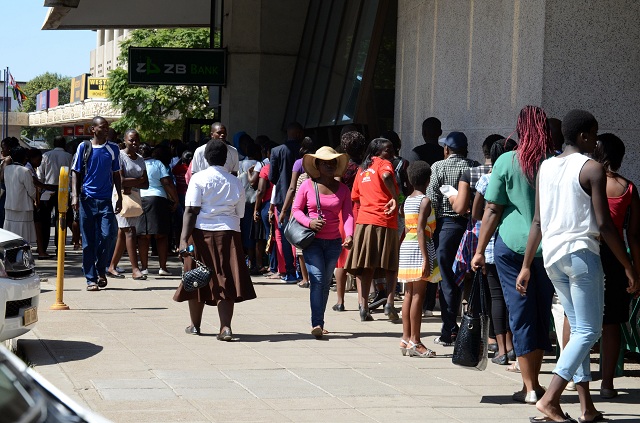Big kill for banks

Business Reporters
WITH cash shortages persisting, local banks are making a killing from repeat daily withdrawal charges after capping individual withdrawal limits at $200.
In Bulawayo and other parts of the country, long winding queues continued yesterday as depositors are forced to return three or four times per week to withdraw their money.
With teachers receiving their 2015 bonus Tuesday, congestion heightened at the banks while some workers and pensioners still struggle to get their money.
Banks, notably POSB, ZB Bank, CABS, Agribank and FBC Bank, have temporarily disabled their ATMs to manage cash outflow while supermarkets have also tightened the screws on the cashback facility for shoppers.
Depositors pay monthly service charges of about $10 and above while the minimum daily withdrawal fee ranges between $2 and $4 per transaction.
This effectively means some depositors, despite enduring long hours in queues waiting to withdraw their money, are parting with about $8 charged in withdrawal transactions to access their pay.
“This is cheating. The cash shortage isn’t our fault as depositors. Banks are robbing us of our money. They should slash these charges because they’ve reduced withdrawal limits,” fumed one depositor in the queue at a bank in Bulawayo.
Two weeks ago Steward Bank CEO Lance Mambondiani called for the scrapping of bank charges, which he blamed for scaring away depositors.
He challenged the banking sector to improve service efficiency and urged innovativeness in enhancing client convenience — warning that some banks risk losing business in the long term.
The shortage of cash in the country is attributable to a number of factors that include the depletion of bank nostro balances and the dysfunctionality of the multi-currency system as the country is now predominantly using US$ for almost all transactions.
Economic experts have also said the prevailing cash crisis was a recipe for disaster in terms of business efficiency and reputation for banks in the eyes of the public.
“Given the cash shortages being experienced, it means that bank clients are being unnecessarily prejudiced of their cash as they’re charged withdrawal fees multiple times on every transaction,” said Trust Chikohora, an economic analyst.
“Maximum withdrawal limits of up to $200 a day have been applied by some banks and this isn’t supposed to be.
“The daily withdrawal limits are compromising business also. Withdrawal limits shouldn’t be there because already we’ve enough constraints hindering economic recovery.”
Chikohora urged the government to act swiftly on the issue, which he said has the potential to inflict further damage on the doing business image of the country and repel investors.
The mining sector is already feeling the pinch with some small scale miners resorting to black market sales due to delays in accessing their cash at official Fidelity Printers buying points.
To him the solution to the cash crunch requires a broader macro-economic policy intervention by authorities.
In the short-term, he said, the nation should be encouraged to use plastic money as well as ensuring that devices that accept plastic money are installed and operate efficiently at reasonable charges to the client.
“This cash shortage is a broader issue of macro-economic policies that monetary authorities need to address in the long-term so that we don’t have these manifestations that are a result of the liquidity crisis in the economy,” added Chikohora.
“If such a situation continues to prevail going forward, we wouldn’t be surprised to see the government even staggering salaries for its workforce.”
Zimbabwe National Chamber of Commerce Matabeleland region vice chairperson Sisa Sibanda said: “The cash shortage has detrimental effects to the economy. However, we’re still to have dialogue with our members pertaining the issue and the challenges they’re facing”.
Affirmative Action Group (AAG) national vice president Sam Ncube expressed concern over the issue and urged the government to act urgently to restore normalcy.
Reserve Bank of Zimbabwe Governor John Mangudya has urged calm as he appealed to the banking public to adopt the use of plastic money in order to minimise high demand for cash associated with traditional payment dates.
The central bank is expected to announce policy measures to deal with the cash shortages this week. The measures will deal with the restoration of fundamental principles of the multi- currency system to ensure that the burden of demand for cash is spread among various currencies that include the rand, euro among others within the multi-currency basket.
“The market-friendly policies are going to focus on the sources, distribution and utilisation of foreign exchange in Zimbabwe,” said Mangudya.
A majority of Zimbabweans do not have bank accounts and generally prefer keeping their money at home due to historic mistrust on banks after losing their money when the country switched to the multiple currency system in 2009.
The central bank has also pointed to rampant externalisation of funds by some unscrupulous individuals and businesses that were not banking locally. Some foreigners have been arrested while trying o smuggle thousands of dollars across the borders.
The US$ has substituted all the other currencies such as the rand, pound and the euro which were in use at the commencement of the multi-currency system in 2009.
Mangudya recently said the switch from other currencies to the US$ is due to its strength which is now considered to be a safe currency throughout the world. He said the strong US$ has made Zimbabwe to be a high cost producing country and a very expensive tourist destination.











Comments